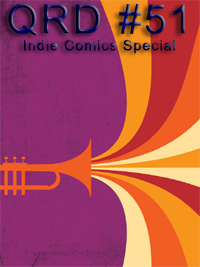
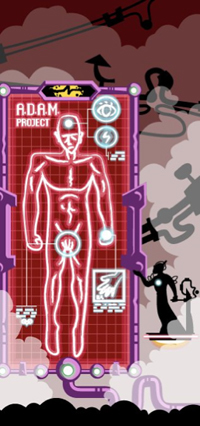
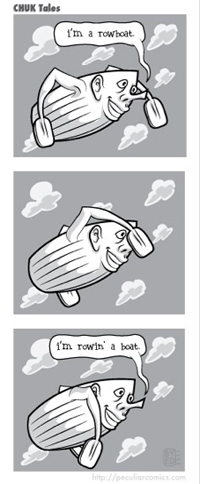
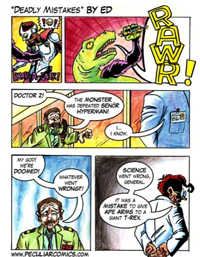
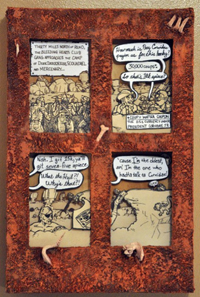
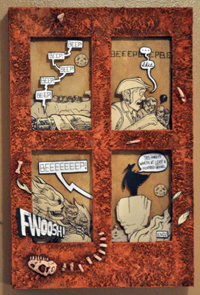
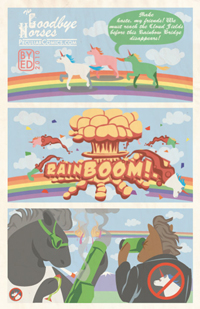



June 2011
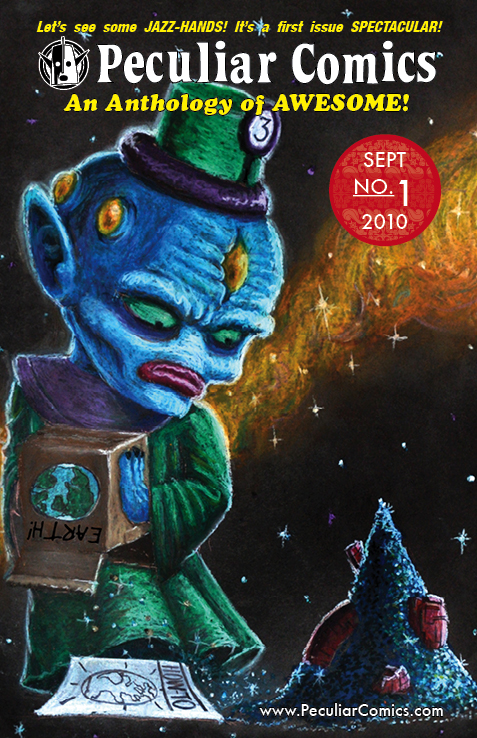
City: Burke, VA
Comics: Peculiar Comics
Websites: www.peculiarcomics.com
QRD – How old were you when you first got into comics & did you always stick with them or did you come back to them?
ED – My dad, being the single-most well-rounded person I know, made regular trips to the comic store for a large chunk of my childhood, so I really can’t remember a time when comics weren’t in my life. It was also during that time that I was hooked to the Batman & Superman WB cartoons & the X-Men cartoon (I was the target demographic, & boy did my parents’ wallets suffer whenever we entered a Toys R Us). Somewhere along the line I took a passing interest in manga & anime (more so the latter) & my love of American sequential art dwindled...until my sophomore year of college. I moved into a house off-campus with a few friends from the dorms. Two of them, Steve & “Tater-Tot”, had used the summer to get into Marvel’s Civil War. Always the contrarian, I decided to jump into Planet Hulk & Annihilation, & from there I was hooked. Now? Comics are my main vice. Oh the unfortunate things I’ve done in dark alleys to get my fix!
QRD – What was the first comic book you ever bought?
ED – The one I remember spending my own money on was one of those ninety-nine cent X-men comics that featured Magneto versus Apocalypse. I don’t remember what happened; I just remember the idea of those two fighting blew my six-year-old mind.
QRD – How old were you when you put out your first comic?
ED – I remember stapling a bunch of paper together when I was maybe nine years old & starting a story about a kid who found a magic ring in a treasure chest in an alley. Thinking back on it now, I don’t think I ever planned on the character taking the rest of the chest, let alone an actual story. In terms of actually unleashing a comic into the world, I think the first Peculiar Comics page came out sometime in late 2008.
QRD – What decade do you think produced the best comics?
ED – Every decade that produced comic books had its ups & downs. If I were to go back in time solely to be a part of comics culture at the time, I’d have to say the sixties. Everything I read from that era still feels full of new ideas & hope for the future. In terms of mainstream comics, I feel it was the most experimental.
QRD – Why comics instead of just writing or drawing?
ED – Ideally, I’d like to write & have someone much more talented than myself craft the look & feel of my stories. That said, the entirety of the sequential best matches how my brain operates in terms of crafting a story.
QRD – Do you see mini-comics & indie comics as paths to mainstream comics or as their own unique media?
ED – I see both as the conjoined twins of sequential art, sharing a mysterious organ that science has yet to identify. Thus, no one quite knows whether or not it would be fatal to separate them. You can’t really have on without the other.
QRD – How many copies of your comic do you print in your first run?
ED – Aside from infinite PDF copies, after reviewing a proof, I order ten physical copies for the floppy book. For the minicomics, a first run is usually around twenty for the brochure-style comics & fifteen for the coloring book adaptation of the “On Mt. Maboogiewoogie” drabble comic.
QRD – How much do you think comics should cost?
ED – Depends on the content & delivery system. For mainstream books, I think the $2.99 price point is perfect for print & I’d like to see them stick to $.99 for digital. As for indie comics, I’d like to see a “pay-what-you-like” model become the popular price point, since it seems to be working well for music.
QRD – How many books do you produce a year & how many would you like to?
ED – For fifteen-to-twenty-something-page issues, I can pump out four a year... hopefully. Minicomics, one-shots, & everything else are a big fat variable. Between a full-time job, a three-hour round-trip commute every day, & freelance work, I have to fit in comics where I can. Ideally, I’d like to do nothing but make (& read) comics all the ******* time.
QRD – Do you think stories should be serialized or delivered as complete works?
ED – I think that depends on the story & the storyteller. As for most mainstream superhero stories written with a definite arc in mind, they should come out as trades & maybe even larger collections if there’s a grander story being told. Some, however, are written for the issue with fantastic cliffhangers, like DC’s “Zatanna”, which is one of my favorite titles at the moment. Short answer: I’ll take ‘em how I can get ‘em.
QRD – How are comic strips different than comic books & which medium do you prefer?
ED – Again, I think this depends on the story & storyteller. Calvin & Hobbes wouldn’t work as a twenty-four page floppy, & Jack Kirby’s Fourth World would fall flat as a daily strip. Both have their pluses & minuses, & I’m happy & eager to explore both.
QRD – How long is it from when you start a comic until it’s printed?
ED – That’s a big variable. I did one one-pager at S.P.A.C.E. that I knocked out from concept to pencils that day. At the same time, I have story bibles for huge universes that might not see print until years later. It all depends on the time frame I have to work with & what I decide my priorities are.
QRD – What do you do better with your comics now than when you first started?
ED – I’m much better at staying on task than I used to be. Part of that might have to do with having started out in college surrounded by distractions; whereas now I’m in my parents’ basement, which is a nice & isolated place to work. I also grew accustomed to using sticky notes & yellow legal pads to make lists that take up quite a bit of space on my desk, so I’m forced to pay attention to them.
QRD – At what point in the artistic process do you work digitally?
ED – I switch back & forth depending on the project. With the vector pieces, it’s 100% digital, after sketching out a rough layout for blocking & to get my ideas down quickly. With my more “artsy” shadowbox “Dire Earth” pages, it started off as pencil layouts; each layer was inked & scanned; adjustments were made digitally
QRD – What do you think of digital comics & webcomics?
ED – They’re advancing the medium, which is always a positive. While there certainly are formulas for webcomics, I think digital comics - in terms of production & delivery -are a giant chaotic ball of string that needs to be worked out by the larger companies to better benefit the independents.
QRD – Do you prefer working in color or black & white?
ED – When hand-drawing a piece, I like doing it in black & white. Digital? Color all the way. Depends on the story. I’ve got a soft spot for sepia, though.
QRD – How many different people should work on a comic & what should their jobs be?
ED – Depends on the project.
QRD – How do you find collaborators?
ED – I’ve had a few that have fallen through for various reasons. One found me via a message board, & a few others have e-mailed me after seeing my work & a couple others might come out of having presented at S.P.A.C.E. I’m not adverse to collaborating when it’s needed, but other times I’m too much of a control freak to let anyone else handle it.
QRD – How tight do you think a script should be as far as telling the artist what to draw?
ED – Depends on the artist. I have a few scripts I want to turn into comics, but because I don’t have an artist lined up (*cough* ifyouwannadrawtheme-mailmeat ED@peculiarcomics.com *cough*), I don’t know how to write for them. That said, because I don’t know the artists for these scripts, I’ve left them fairly loose.
QRD – What comic book person would you be most flattered to be compared to?
ED – Akira Toriyama. Say what you will about Dragon Ball (which I love without shame), but the man has built a giant unique world with no plan & only his imagination. I strive to be half the creative force he has been.
QRD – What do your friends & family think of your comics?
ED – My friends either say that they enjoy my comics or that my comics are weird. I think both are compliments, although I’m mostly certain that their “enjoyment” is a little exaggerated for the sake of my fragile artist’s ego.
QRD – What do you think of superheroes?
ED – Unashamedly love ‘em, but I also recognize that they’re not all there is to comics.
QRD – Marvel or DC?
ED – Both for different reasons & different characters. DC sticks to the mythology of the superhero & is less afraid to do weird & wacky. On the other side of the street, I like Marvel because I think it’s evolved further from its roots in the golden & silver ages in ways that the DC Universe did not.
QRD – What comic characters other than your own would you like to work with?
ED – I would LOVE an opportunity to play in either of the “Big Two” sandboxes. Specifically, I’d like to work with the Eternals on the Marvel side & maybe even the New Gods on the DC side.
QRD – Ideally would you self-publish?
ED – I guess I self-publish now as it is? I dunno. The line between digital & print publishing makes everything a little blurry.
QRD – What conventions do you try to attend & why?
ED – As a fan, I try to attend whatever I have the time & money for. I’ve been a huge fan of the VA Comicon & am glad to see that it’s had more support in recent years.
QRD – What do you do to promote your books?
ED – However I can. Facebook, Twitter, Tumblr, word of mouth, mustached business cards, smoke signals, carrier pigeons, & URLs tattooed onto the heads of messenger boys I sent out into the wild.
QRD – Do you think your comics are well suited to comic shops or would sell better elsewhere?
ED – Depends on the shop. I’ve sold a few minis through Velocity Comics in Richmond, but they’re very indy-friendly & have a customer base that supports independent comics creators (up to & including half-baked DIY efforts like mine). On the whole, though, I’m not in this game to make money. Any way I can get my product out there, despite any cost to me, is worthwhile.
QRD – What other medium would you like to see some of your comics made into (television, film, games, action figures, etc.)?
ED – I’ve toyed with the idea of turning my shadowbox strips into short animated features, seeing as I’ve got the panels laid out in separate layers in Photoshop. Bringing them into After Effects shouldn’t be TOO hard. The problem is finding the time. I’ve also considered figuring out how to mold my own toys, but that’s FAR down the list of priorities.
QRD – Do you consider yourself a comic collector or a comic reader or both?
ED – Both. Without a doubt. That said, the sole point of “collection” for me is to be able to read these again. I have no delusions about how much any of my funny books are worth.
QRD – What do you see as the most viable mediums for comics distribution 10 years from now?
ED – I see digital as being the most widespread platform for comics in the future. That said, I don’t think we’ll ever see the complete extinction of brick & mortar shops. The love for a physical product will never die out for any medium, as shown by increased vinyl sales in the past few years. There will always be physical places to find “shelf porn” & unique, comic art objects, but most of our weekly funny book reading will be on screens.
QRD – What would you like to see more people doing with comics?
ED – I’d like to see more playing around with the sequential art medium AS a medium. Too many people are focused on producing print products & working within boundaries defined by the print industry. There’s so much more you can do with digital, as well as with the physical medium. I love my floppies & trades & hardcovers, but it’s time to find different ways of utilizing this strange & glorious medium. Get out of the box & make something awesome & different!
QRD – Anything else?
ED – I like making stuff, & I like
occasional acknowledgement that people like the stuff I make. That said,
I’d still be making stuff if it was just me alone in the woods with no
one to show it off to.







